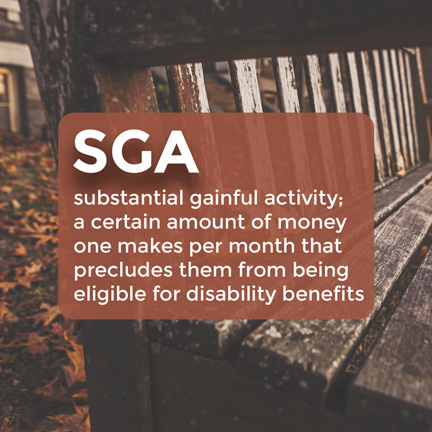What Is the Difference Between DIB and SSI?
Social Security provides two programs for disabled individuals seeking financial assistance: disability insurance benefits (DIB) and supplemental security income (SSI). Understanding the difference between the two programs can be confusing, especially for people who are considering applying for disability benefits. Which program is best suited for you? Let’s take a look at each program to […]

February 26, 2018

Social Security provides two programs for disabled individuals seeking financial assistance: disability insurance benefits (DIB) and supplemental security income (SSI). Understanding the difference between the two programs can be confusing, especially for people who are considering applying for disability benefits. Which program is best suited for you? Let’s take a look at each program to determine the differences between the two.
DIB: Disability Insurance Benefits

In order to qualify for DIB, the Social Security Administration (SSA) will look at three things: your work history, your financial circumstances, and your disability.
Work History
Of the two programs, DIB is the most similar to any other private insurance program. Participants, in the way of Social Security taxes, pay into the program the way you might pay a monthly premium. Then, when you become disabled, you’re eligible to withdraw benefits because you’ve paid into the program for years.
There are key differences, however. First, because DIB is run by Social Security, it is a government-run program. Second, unlike with a private insurance plan, everyone has to pay into DIB, regardless of whether or not you ever withdraw benefits. Third, paying into the program is only part of what qualifies you for DIB. Simply paying into the program may not necessarily mean you’re eligible for benefits.
Social Security taxes are automatically taken out of your paycheck if you’re not self-employed. That means that your work history is an important factor in your eligibility. You can’t pay Social Security taxes if you’re not working or if you’re being paid “under the table”; therefore, you won’t be able to qualify for DIB when your disability begins to prevent you from working.
Applicants are often afraid that if they’re not currently working, they won’t be able to qualify for DIB. However, the opposite is usually true. It can be more difficult to qualify for DIB if you are working. What matters most is your work history, not the fact that you’re not working now. Typically, you need to have worked five of the last 10 years in order to qualify for DIB, although that may vary depending on your age and the date you become disabled.
 Financial Circumstances
Financial Circumstances
As mentioned above, it can actually be more difficult to qualify for DIB if you’re currently working than if you’re currently unemployed. Why?
To qualify for DIB, the SSA has to make sure that your disability is preventing you from participating in substantial gainful activity (SGA). SGA is a level of work activity that results in a certain amount of money each month.
With DIB, the idea is that even if you’ve paid into Social Security and have a 50-year work history, you shouldn’t be able to withdraw benefits if you’re still able to make a living, regardless of your disabled status. SGA is a way to measure whether or not you’re still able to in some way provide for yourself despite your disabling conditions.
In 2018, a person is considered to meet SGA if they earn $1,180 a month. For those who are statutorily blind, that number goes up to $1,970.
Disability
If you have a solid work history and aren’t making SGA, then you’ve essentially met the financial requirements for DIB. Now it’s time to look at the reason you’re applying for DIB in the first place: your disability.
To qualify for DIB, your disability must prevent you from working. Unfortunately, the SSA can’t simply take your word for it that you can’t work. They’ll need to investigate your claim to see if your disability truly prevents you from engaging, not just in the career you’ve been trained for, but any occupation. They’ll have to take a look at your medical records and make sure there’s not a medicine, procedure, or therapy that could minimize your symptoms and allow you to work.
Because of this, it’s important to prove to the SSA that you’re continuing to seek medical treatment throughout your claim. By seeking medical treatment, you’ll create official documentation of your conditions, including whether or not they’re getting better or worse. You’ll also be able to prove that you’re doing everything you can to return to work, but it’s simply not enough.
SSI: Supplemental Security Income

In order to qualify for SSI, the SSA will look at two things: your household income and your disability.
Household Income
Unlike DIB, SSI is a needs-based program. Instead of being similar to an insurance program like DIB, SSI is more like a welfare program. A lack of work history will have no effect whatsoever on your eligibility for SSI.
However, you do have to meet certain income limitations in order to qualify for SSI. Unlike with DIB, where the SSA looks at your personal finances, the SSA has to look at your household income for SSI. That means that what your spouse, partner, roommate, or child is making could affect your SSI eligibility.
The SSA doesn’t count all of your earnings, however. They take your total income and subtract the income they don’t count to get your “countable income.” If your countable household income is above the limit, you won’t be eligible for SSI.
For more information about what the SSA does and does not count as countable income, click here.
Disability
The same rules for DIB apply here for SSI. Your disability must prevent you from working. A solid history of medical treatment, as well as proof of continuing treatment, will be essential to your case.
Help from an Indiana Social Security Disability Lawyer
At Hensley Legal Group, we assist individuals interested in applying for DIB. If you’re considering applying for benefits or are unsure of which program is best suited for you, our Social Security disability lawyers can help. Call us today or contact us online for a free consultation.
Available 24/7
Free Case Review
You won’t pay any fees until we win your case.
It’s easy - you can: